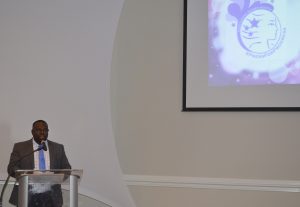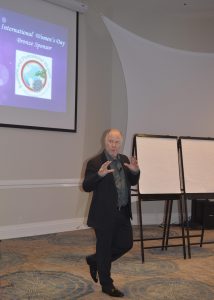Gender-based violence workshops
 Cayman Islands: Making the case that gender-based violence is not a women’s issue
Cayman Islands: Making the case that gender-based violence is not a women’s issue
GRAND CAYMAN (GIS) – Gender violence prevention leadership training workshops challenged attendees to examine ways in which they can advance gender equality.
The sessions, held on Thursday, 1 and Friday, 2 March 2018 to celebrate International Women’s Day on 8 March, also marked the start of Honouring Women Month, run by the Department of Counselling Services’ Family Resource Centre.
“Given the increasing topicality of such issues, as most recently seen by the ongoing #MeToo and other hashtag campaigns, awareness is spreading about the prevalence of sexual violence,” said Minister for Health, Environment, Culture and Housing Hon. Dwayne Seymour in his opening remarks. “These sessions will encourage attendees, most significantly men, to acknowledge the role they, too, must play in changing this dynamic. We all have leadership roles to create positive outcomes by driving behavioural change.”
Mr. Seymour, who has nine aunts and is the father of four daughters, also shared a personal anecdote about how his mother had brought him up to respect women.
The facilitators of the workshops were gender equality author, activist and trainer, Dr. Jackson Katz, and LaShonda Coleman, who leads Pepperdine University’s Sexual Violence Elimination team.
Mrs. Coleman said ignoring sexual aggression, whether physical, visual or verbal, normalised such attitudes. She suggested that, like weeds, such thinking had to be cut down and ripped out at the roots, which is part of the pedagogy of the Mentors of Violence Prevention programme. Mrs. Coleman said that gender-based violence reflected the historically unequal power relations between men and women.
Furthermore, she suggested that standing against sexual aggression was now recognised as a human rights issue.
Both facilitators engaged participants in discussion. Attendees included Councillor Austin Harris, Councillor Barbara Conolly, senior civil servants and private sector participants.
Dr. Katz gave examples of how the women’s movement and gender activism initiatives, far from demonising and marginalising men, had actually benefitted them.
In suggesting that men had traditionally avoided confronting friends and colleagues who were sexist, he said that “the standard you walk past is the standard you accept”. Introducing participants to the “bystander approach” to gender violence prevention, the facilitators helped attendees to recognise the multiple opportunities in which one can challenge or interrupt the attitudes, beliefs and values that perpetuate violence against women long before a physical act is committed.
The workshop included a video that had gone viral of a former Chief of the Army in Australia who had robustly denounced the sharing of explicit images on social media of female soldiers by their male colleagues. The educator encouraged others to tackle the issue in equally authentic terms. They suggested that everyone had the potential to be a leader who could influence their peer groups, friends, family members and co-workers when espousing positive attitudes gender equality.
Dr. Katz said that gender aggression by males was often linked to them experiencing domestic violence as children and teenagers. He also said that 57 per cent of mass shooting perpetrators in the U.S. in the past 10 years share a history of domestic violence in their childhood or adult homes.
In viewing gender-based violence as a societal problem rather than a private one, the facilitators suggested that society had a collective responsibility to challenge gender violence in ways that are respectful but uncompromising.
Attendees were encouraged to define elements of leadership and were given gender violence prevention leadership strategies they could use in the real world.
IMAGES: (GIS)








